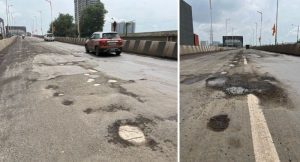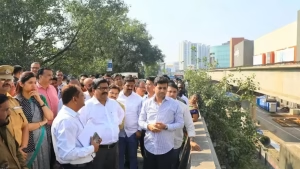The Maharashtra State Road Development Corporation (MSRDC) has initiated emergency Palava flyover re-asphalting operations following unprecedented public outcry over severe structural deterioration. This ₹250 crore infrastructure project, inaugurated on July 4, 2025, by Shiv Sena MLA Rajesh More, has become a symbol of construction quality concerns within days of its opening.


Other: Co-founder of Netflix backs Trump on the H1B Visa Fee.
Immediate Safety Concerns Trigger Public Outrage
The 562-meter-long flyover connecting Dombivli to Kalyan experienced catastrophic surface failures within 24 hours of inauguration. The Palava flyover in Kalyan, Mumbai, faced closure within hours of inauguration due to safety concerns and poor road quality, with loose tarmac causing accidents and requiring immediate repairs. Multiple incidents of vehicle skidding prompted immediate closure, forcing authorities to acknowledge the severity of construction defects.
Palava flyover re-asphalting became inevitable after viral videos showed extensive damage across 450 meters of the 562-meter structure. Several videos showing the poor condition of the bridge are going viral on the internet, with users calling it a ‘skidding zone’. The rapid deterioration raised serious questions about material quality, construction standards, and supervision protocols employed during the initial construction phase.
Technical Analysis of Construction Failures
The Palava flyover re-asphalting requirement stems from multiple technical failures identified by engineering experts. Primary issues include inadequate surface preparation, substandard bituminous materials, and improper compaction techniques. An MSRDC official told the media outlet that the road became slippery because the contractor failed to follow prescribed construction specifications.
Initial emergency repairs involved road gritting to restore traction, but these temporary measures proved insufficient. The underlying structural integrity concerns necessitated comprehensive surface reconstruction rather than superficial patching. Engineering assessments revealed that the original asphalt layer lacked proper adhesion properties, leading to rapid degradation under traffic loads.
MSRDC Response and Remedial Measures
Following intense public pressure and political criticism, MSRDC launched comprehensive Palava flyover re-asphalting operations. Contractors from the Maharashtra State Road Development Corporation (MSRDC) have been rushed to the site and are now working to patch up the hazardous areas under public and administrative pressure. The corporation initially denied the presence of potholes before acknowledging the construction quality issues.
The remedial work involves complete surface reconstruction using enhanced specifications and improved quality control measures. MSRDC officials have committed to implementing stricter supervision protocols and material testing procedures to prevent similar failures. The Palava flyover re-asphalting project includes upgraded bituminous concrete mixtures designed for heavy traffic conditions and adverse weather resistance.
 Financial Implications and Accountability
Financial Implications and Accountability
The Palava flyover re-asphalting operation represents significant additional expenditure beyond the original ₹250 crore project cost. The Palava flyover, built with an aim to with an aim to ease traffic between Dombivli, Kalyan, and Navi Mumbai, is 562 meters long and came up at an estimated cost of Rs 250 crore. Taxpayers now face an additional financial burden for correcting preventable construction defects.
Opposition parties have demanded accountability measures against responsible contractors and supervising officials. The incident has triggered broader discussions about infrastructure project management and quality assurance mechanisms within government-funded construction initiatives. Contractor liability provisions and performance guarantee clauses require immediate review to prevent similar occurrences.
Impact on Regional Connectivity
Before requiring Palava flyover re-asphalting, this infrastructure was designed to alleviate chronic traffic congestion along the Shilphata-Kalyan corridor. The Rs 250 crore project was aimed at easing traffic along the congested Shilphata-Kalyan corridor. The repeated closures and repair operations have instead exacerbated traffic problems, forcing commuters to use alternative routes.
Local businesses and residents have expressed frustration over delayed project benefits and continued traffic disruptions. The Palava flyover re-asphalting timeline directly affects regional economic activities and daily commuter schedules. Transportation authorities have implemented temporary traffic management measures while comprehensive repairs continue.
Quality Control Standards in Infrastructure Projects
The Palava flyover re-asphalting crisis highlights systemic issues in infrastructure quality management across Maharashtra. Construction industry experts emphasise the need for enhanced material testing protocols, independent quality audits, and stricter contractor certification requirements. Current oversight mechanisms appear inadequate for ensuring project durability and public safety standards.
Professional engineering associations have called for mandatory third-party quality assessments during critical construction phases. The Palava flyover re-asphalting incident serves as a case study for improving construction industry practices and regulatory frameworks governing public infrastructure projects.
 Public Safety and Future Prevention
Public Safety and Future Prevention
Immediate safety concerns driving Palava flyover re-asphalting operations include preventing accidents and ensuring structural integrity. Multiple vehicle skidding incidents within the first week demonstrated the urgent need for corrective action. Emergency response protocols have been activated to minimise public risk during repair operations.
Long-term prevention strategies must address contractor selection criteria, construction supervision standards, and material quality specifications. The Palava flyover re-asphalting project implementation will serve as a benchmark for future infrastructure maintenance protocols and quality assurance mechanisms.
Political Response and Administrative Action
The Palava flyover re-asphalting controversy has triggered significant political debate regarding infrastructure development accountability. Opposition parties have criticised the ruling administration for inadequate project oversight and premature inaugurations. Administrative reforms targeting construction quality management have been proposed following this incident.
Government officials have promised comprehensive investigations into contractor performance and supervisory lapses. The Palava flyover re-asphalting project outcomes will influence future infrastructure development policies and contractor accountability measures across the state.
Conclusion: Lessons for Infrastructure Development
The urgent need for Palava flyover re-asphalting represents a critical lesson in infrastructure project management and quality assurance. This incident underscores the importance of rigorous construction standards, comprehensive quality control, and transparent accountability mechanisms in public infrastructure development. Future projects must incorporate enhanced oversight protocols to prevent similar costly failures and ensure long-term structural integrity for public safety and economic efficiency

